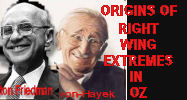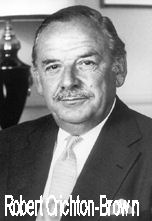Conservative think tanks and public politics - review of article by Marcus Smith and Peter Marden
 How did stealing from the public to enrich the private sector become a norm in Australia and why do some religions give it moral credence? This is a reminder of the existence of an important, publicly available article about the rise of right-wing so-called 'think tanks' in Australia since the mid 1970s and their recent tendency to combine forces with the religious right. Here, from another source and angle, are arguments that reinforce candobetter's message about the problems Australia has with the growth lobby and its merchants.
How did stealing from the public to enrich the private sector become a norm in Australia and why do some religions give it moral credence? This is a reminder of the existence of an important, publicly available article about the rise of right-wing so-called 'think tanks' in Australia since the mid 1970s and their recent tendency to combine forces with the religious right. Here, from another source and angle, are arguments that reinforce candobetter's message about the problems Australia has with the growth lobby and its merchants.
Manufacturing right-wing consent
An article by Marcus Smith and Peter Marden (2008): "Conservative Think Tanks and Public Politics," Australian journal of Political Science, 43:4, 699-717 describes how so-called 'think tanks' rose with the funding of private industry players who found in them a way to influence public perception to confuse business and commercial interest as "synonymous with public values". A hallmark of the language used for this was the notion of 'commonsense'. The authors identify a 'fact/value dichotomy' to push a 'logic of economic growth'.
They don't give this example but, "Jobs are more important than trees," immediately came to my mind as a slogan mindlessly repeated at election times.
 The authors identify a 'pivotal shift' around 1980 when Sir Robert Crichton-Brown[1] led a political campaign to make business more pro-active in policy making processes and public debate, apparently with the aim of bolstering a privileged minority.
The authors identify a 'pivotal shift' around 1980 when Sir Robert Crichton-Brown[1] led a political campaign to make business more pro-active in policy making processes and public debate, apparently with the aim of bolstering a privileged minority.  Significantly preceding this campaign were visits to Australia in 1975 and 1976 of ultra-economic rationalists, Milton Friedman and Friedrich von Hayek. (See more about Friedman and the Chicago School in Naomi Klein's once in a century book, Shock Doctrine.) The result has been,
Significantly preceding this campaign were visits to Australia in 1975 and 1976 of ultra-economic rationalists, Milton Friedman and Friedrich von Hayek. (See more about Friedman and the Chicago School in Naomi Klein's once in a century book, Shock Doctrine.) The result has been,
"a mutually supportive network of market fundamentalists and vested interests that is committed to undermining any opposition."
Mass media the corporate messenger
Smith and Marden write:
"Our concern derives more from the discursive force of think-tank commentary received and appropriated as 'expert opinion' by a media too lazy to apply rigorous critical analysis and a public interested but unable to access alternative views."
The success of the right-wing movement in influencing the media and politics is the result of
"unrivalled access to financial, intellectual and political resources; the availability of technologies that make wholesale manipulation of public opinion possible and which are used with almost negligible transparency or accountability; and, effectively, the anonymity of many participants mean this activity not only has the capacity to undermine any notion of a democratic politics, but is, in fact, the very intention."
The paper gives the example of the IPA's 'great Australian Dream project' as one where an alliance of interests was formed and operated in public debate in the Australian political context to popularise the notion that housing unaffordability was almost solely the result of irrational planning regulations stopping the release of land. The authors chronicle how Federal Treasurer Costello in August 2006 introduced into Parliament The Tragedy of Planning: Losing the great Australian Dream", a report about housing affordability, compiled by the IPA's Alan Moran, without anyone being made aware that the project was chaired by Bob Day, a former Housing Industry of Australia (HIA) president. They describe how these ideas were taken up and promoted far and wide in the mainstream press and by the Australian Christian Lobby (ACL), whom Day had addressed. They also note links to a web site in the USA called Demographia, which is run by Wendell Cox, who also has links to the IPA.
Smith and Marden criticise the rationale of unfair planning regulations preventing release of land because they feel that the issue of interest rates should have been included as the 'overwhelming reason' why young Australian families were finding it increasingly difficult to afford a home." They add,
"There is not enough space here to analyse in detail the position of the IPA with regard to the housing issue; however, what is clearly evident in the language used is the unwavering faith in free market values coupled with an appeal to conservative family values, all the while serving vested interests in the housing construction industry, which has supported the efforts of the IPA. ...focusing simply on planning regulations as the sole cause of the increase in house prices and the obvious solution being to 'remove the burden of red tape'. The argument is designed to conceal more than reveal, relying on jingoistic labels, such as the 'Banana Brigade' (build-absolutely-nothing-anywhere-near-anything) and the 'Consolidati' (urban-consolidation-culturists), which serve all too conveniently as scapegoats who are accused of protecting property investments at the expense of young families seeking a first home. The reality is that the issues surrounding the built environment are far more complex, with powerful vested political and economic interests seeking to control the debate."
Since they wrote this article, of course, there has been an absolute avalanche of special favours from government to the property development and growth lobby.
Candobetter.net would say that the overwhelming reason for high housing prices is that population growth causes an inflationary demand. High interest rates are just the icing on the cake for profiteers who hold Australians to ransome. Neither Smith and Marden nor the IPA seem to consider impacts on the natural environment or population policy. Andrew Norton's "Lone Classical Liberal" blog has some correspondence from a different angle, attacking Smith and Marden for getting the Australian dream wrong, claiming that Australians love failing to see that people "prefer, according to surveys, detached houses to flats." Other correspondence on the same blog also attacks universities for producing low quality arguments.
Perhaps because of its age, this excellent paper lacks a quantity of concrete examples of profiteering through the manufacture of consent, when examples in real life seem to abound. If we at candobetter.net did not have many pages of such examples, including links to The Growth lobby and its Absence we might find the story of this paper hard to believe. Instead, we find it corroborative and suppose that the reason the authors don't give many examples, but maintain their argument in the general and philosophical relates to the date of the research, prior to its publication, in 2008. At that time the scam of population growth was barely mentioned publicly. Nonetheless the article fills in some blanks. It is very well written, effective and provides fascinating documentation of associations between groups of people via their shared values and ideas.
Of loafs and fishes
The authors point at the link between religion and the growth lobby in the Alan Moran/Bob Day Australian Dream example. They then discuss the rise of the religious right in the United States and recently in Australia, finding a synergy between the religious right and the political right.
The adoption of 'Prayer Breakfasts' by Australian politicians from both major parties is one example of the surreptitious inclusion of religious sentiment into mainstream politics. ... The evidence of a transference to Australia of politico-religious values that are commonly associated with the political landscape of the USA is a major influence informing the emerging neoconservatism."
I was also bothered by the sudden introduction of Prayer Breakfasts as well as, earlier, the rise of pronatalism influenced by Christian groups, cropping up like the undead DLP, for instance with Kim Beasley, like father like son. (See "Pronatalist policies in Australia 1945-2000.") For this reason it has been a relief to have a childless unmarried atheist for Prime Minister, (Julia Gillard), even if experience tells me that branding can be deceptive, but then I tell myself that she must have something real going for her because the mainstream press hate her so.
So, what's the deal with religion and fascism?
"In attacking the notion of the state as benevolent, much of the critique recasts the state as an intrusive secular institution interfering in the relationship between the individual and God. A restoration of Christian ethics that are framed in natural law enshrined in Holy Scripture, shifts the emphasis of the state from provider to disciplinarian; the enforcer of the authority of the word of God and protector of the Judeo-Christian tradition. Within this framework, market fundamentalists and neoconservatives have identified a common interest that has enabled the formation of alliances between powerful corporate interests and right-wing conservatives and fostered a far more cohesive and influential political network."
NOTES
Sir Robert Crichton-Brown is a patron of Sydney University's Medical School Foundation, who give his biography thus:
Sir Robert Crichton-Brown KCMG CBE TD
Sir Robert joined the Lumley Group in 1938 in London. After war time service in Iceland, France, India and Burma from 1939 to 1945, he rejoined the Group, holding positions in Sydney from 1947 as Director, Managing Director and Chairman; remaining as a Director until 2003. He was Chairman of Rothmans of Pall Mall (Aust) Limited from 1981 to 1985 and Executive Chairman Rothmans International from 1985 to 1988. He also held positions as Director and Chairman of a range of commercial companies including the Commercial Banking Company of Sydney. Sir Robert was President of the Institute of Directors of Australia from 1967 to 1980, Honorary Federal Treasurer of the Liberal Party of Australia from 1973 to 1985, a Director of Royal Prince Alfred Hospital from 1970 to 1984. He worked with a number of community organisations including the Salvation Army, the Duke of Edinburgh Award Scheme, the National Scout Association and the Girl Guides Association of Australia. Sir Robert was a member of Australia’s winning Admiral’s Cup Team in the UK (Balandra) in 1967 and in 1970 winner of the Sydney to Hobart Yacht Race (Pacha).
Sir Robert Crichton-Brown is an Honorary Governor and a Founding Member of the Medical Foundation. He held positions as Honorary Treasurer, and President from 1962 to 1987. Sir Robert was appointed an Honorary Fellow of the University of Sydney in 1987 and is an Honorary Life Governor of the Australian Postgraduate Federation in Medicine.


Recent comments